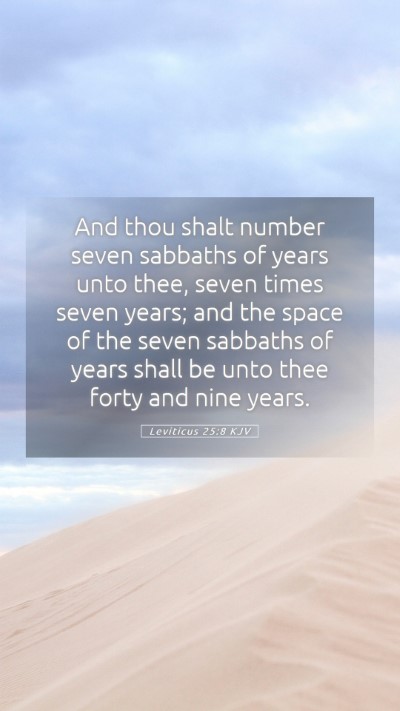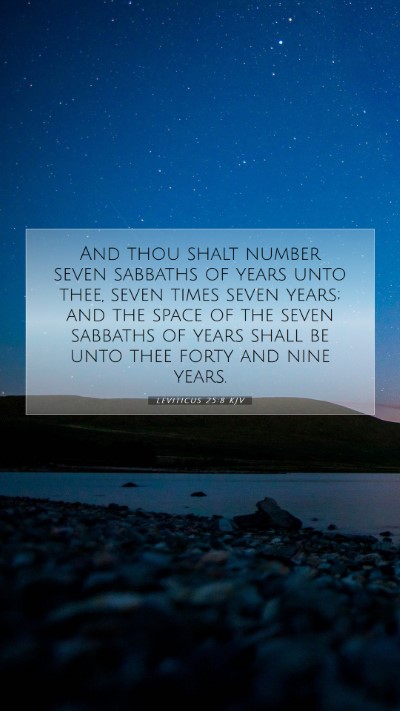Understanding Leviticus 25:8
Bible Verse: Leviticus 25:8
This verse states:
"And thou shalt number seven sabbaths of years unto thee, seven times seven years; and the space of the seven sabbaths of years shall be unto thee forty and nine years."
Overview
Leviticus 25:8 introduces the concept of the Jubilee cycle, which is integral to understanding biblical laws surrounding rest, restoration, and divine order. This verse not only communicates a historical mandate but also spiritual principles that are relevant to modern believers.
Historical Context
As per Albert Barnes, this verse is situated within the larger framework of the Mosaic Law, which was established during Israel's wilderness wanderings. The counting of seven cycles of seven years reflects God's provision and justice for His people, guiding the agricultural and economic practices of Israel.
Thematic Insights
- Divine Order and Rest: According to Matthew Henry, the principle of rest established here serves both as a physical and spiritual rejuvenation, indicating God's rhythm of work and rest.
- Restoration: Adam Clarke emphasizes that this counting is not arbitrary; the fiftieth year marked a time for restoration, indicating that any land sold would return to its original family, symbolizing God's justice and mercy.
- Symbolism of the Sabbatical Year: This verse initiates a cycle representing a deeper spiritual principle—reflection on God’s providence and the coming of redemption, foreshadowing the ultimate Jubilee brought by Christ.
Application of the Verse
Understanding the implications of Leviticus 25:8 extends to personal and community practices:
- Faith-Based Reflection: Encouraging believers to consider their use of resources and the importance of rest in their spiritual journey.
- Social Justice: It calls to mind themes of equality and equity, reminding us to care for the oppressed and marginalized in society, aligning with Christ’s teachings on love and justice.
- Preparing for the Future: Just as the Israelites prepared for the Jubilee year, believers are encouraged to be mindful stewards of what God provides.
Bible Verse Commentary
The commentary on this verse reveals rich layers of biblical understanding:
- Each sabbatical year serves as a reminder of God’s ultimate authority and the necessity of rest.
- This verse is a call to remember that all lands and people belong to God, as further explored in Psalm 24:1.
- In the New Testament context, Christ brings about a spiritual Jubilee, which brings liberation to those in bondage (referenced in Luke 4:18-19).
Cross References
- Exodus 23:10-11: Discusses the Sabbatical year and its implications for agricultural rest.
- Isaiah 61:1: Prophetic declaration concerning liberty and God's favor, resonating with the themes of Jubilee.
- Luke 4:18-19: Jesus reads from Isaiah, proclaiming the year of the Lord's favor, reflecting the Jubilee’s significance.
Conclusion
Leviticus 25:8 serves as a foundational Scripture that not only gives insight into the social and agricultural practices of ancient Israel but also speaks to overarching themes of restoration and divine justice in today's world. By reflecting on the meaning of Bible verses like this one, believers can apply valuable lessons about stewardship, community, and faithfulness.
Further Study
For those interested in a deeper exploration, consider engaging in online Bible study sessions or utilizing Bible study tools that focus on historical context of Bible verses. Study groups focusing on the application of Bible verses in daily life can enrich understanding and encourage practical faith expressions.


